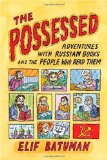Summary | Excerpt | Reviews | Beyond the book | Read-Alikes | Genres & Themes | Author Bio

The runaway French bestseller hailed by the New York Times as “a survivor’s guide to life in the chattering classes.”
If civilized people are expected to have read all important works of literature, and thousands more books are published every year, what are we supposed to do in those awkward social situations in which we’re forced to talk about books we haven’t read? In this delightfully witty, provocative book, a huge hit in France that has drawn attention from critics around the world, literature professor and psychoanalyst Pierre Bayard argues that it’s actually more important to know a book’s role in our collective library than its details. Using examples from such writers as Graham Greene, Oscar Wilde, Montaigne, and Umberto Eco, and even the movie Groundhog Day, he describes the many varieties of “non-reading” and the horribly sticky social situations that might confront us, and then offers his advice on what to do. Practical, funny, and thought-provoking, How to Talk About Books You Haven’t Read is in the end a love letter to books, offering a whole new perspective on how we read and absorb them. It’s the book that readers everywhere will be talking about—and despite themselves, reading—this holiday season.
By all rights, I shouldn’t have to read this book. After all, Pierre Bayard begins with an epigraph from Oscar Wilde: "I never read a book I must review; it prejudices you so." But I did read it, swiftly, ferociously, and with a pen in hand. Many times I underlined a sentence I admired, such as this one: "He who pokes his nose into a book is abandoning true cultivation, and perhaps even reading itself." But just as often, I underlined in fierce disagreement. This book isn’t, finally, about books, but about book conversation, and I had a particularly lively one with it...continued
Full Review
 (646 words)
(646 words)
(Reviewed by Amy Reading).
 Pierre Bayard was born in 1954. He is a professor of literature
at the University of Paris VIII, as well a practicing psychoanalyst. He has
written over a dozen books, most of which have not been translated into English.
Pierre Bayard was born in 1954. He is a professor of literature
at the University of Paris VIII, as well a practicing psychoanalyst. He has
written over a dozen books, most of which have not been translated into English.
Bayard's best-known work in English prior to How to Talk
about Books You Haven't Read is a work of literary detection entitled Who
Killed Roger Ackroyd?, published in 2000. In this book, Bayard dares to
suggest that Hercule Poirot's solution to one of Agatha Christie's best-loved
mysteries, The Murder of Roger Ackroyd, is incorrect and that Christie
has deliberately deceived the casual reader. On his way to fingering the real
murderer, Bayard conducts a sustained investigation into the nature of detective...

If you liked How to Talk About Books You Haven't Read, try these:

by Scarlett Thomas
Published 2011
Smart, entrancing, and boiling over with Thomas's trademark big ideas, Our Tragic Universe is a book about how relationships are created and destroyed, how we can rewrite our futures (if not our histories), and how stories just might save our lives.

by Elif Batuman
Published 2010
The true but unlikely stories of lives devoted — Absurdly! Melancholically! Beautifully! — to the Russian classics.